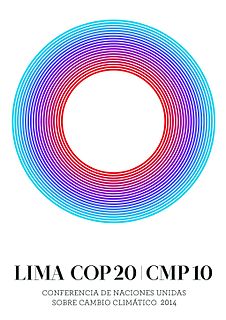The United Nations Framework Convention on Climate Change (UNFCCC) established an international environmental treaty to combat "dangerous human interference with the climate system", in part by stabilizing greenhouse gas concentrations in the atmosphere. It was signed by 154 states at the United Nations Conference on Environment and Development (UNCED), informally known as the Earth Summit, held in Rio de Janeiro from 3 to 14 June 1992. It established a Secretariat headquartered in Bonn and entered into force on 21 March 1994. The treaty called for ongoing scientific research and regular meetings, negotiations, and future policy agreements designed to allow ecosystems to adapt naturally to climate change, to ensure that food production is not threatened and to enable economic development to proceed in a sustainable manner.
Post-Kyoto negotiations refers to high level talks attempting to address global warming by limiting greenhouse gas emissions. Generally part of the United Nations Framework Convention on Climate Change (UNFCCC), these talks concern the period after the first "commitment period" of the Kyoto Protocol, which expired at the end of 2012. Negotiations have been mandated by the adoption of the Bali Road Map and Decision 1/CP.13.

The 2007 United Nations Climate Change Conference took place at the Bali International Conference Centre, Nusa Dua, in Bali, Indonesia, between December 3 and December 15, 2007. Representatives from over 180 countries attended, together with observers from intergovernmental and nongovernmental organizations. The conference encompassed meetings of several bodies, including the 13th Conference of the Parties to the United Nations Framework Convention on Climate Change, the 3rd Meeting of the Parties to the Kyoto Protocol, together with other subsidiary bodies and a meeting of ministers.
After the 2007 United Nations Climate Change Conference held on the island of Bali in Indonesia in December 2007, the participating nations adopted the Bali Road Map as a two-year process working towards finalizing a binding agreement at the 2009 United Nations Climate Change Conference in Copenhagen, Denmark. The conference encompassed meetings of several bodies, including the 13th Conference of the Parties to the United Nations Framework Convention on Climate Change and the third Meeting of the Parties to the Kyoto Protocol.

The 2009 United Nations Climate Change Conference, commonly known as the Copenhagen Summit, was held at the Bella Center in Copenhagen, Denmark, between 7 and 18 December. The conference included the 15th Conference of the Parties to the United Nations Framework Convention on Climate Change (UNFCCC) and the 5th Meeting of the Parties to the Kyoto Protocol. According to the Bali Road Map, a framework for climate change mitigation beyond 2012 was to be agreed there.

The Youth Climate Movement (YouNGO) or International Youth Climate Movement (IYCM) refers to an international network of youth organisations that collectively aims to inspire, empower and mobilise a generational movement of young people to take positive action on climate change.

The Climate Vulnerable Forum (CVF) is a global partnership of countries that are disproportionately affected by the consequences of global warming. The forum addresses the negative effects of global warming as a result of heightened socioeconomic and environmental vulnerabilities. These countries actively seek a firm and urgent resolution to the current intensification of climate change, domestically and internationally.

The 2010 United Nations Climate Change Conference was held in Cancún, Mexico, from 29 November to 10 December 2010. The conference is officially referred to as the 16th session of the Conference of the Parties (COP 16) to the United Nations Framework Convention on Climate Change (UNFCCC) and the 6th session of the Conference of the Parties serving as the meeting of the Parties (CMP 6) to the Kyoto Protocol. In addition, the two permanent subsidiary bodies of the UNFCCC — the Subsidiary Body for Scientific and Technological Advice (SBSTA) and the Subsidiary Body for Implementation (SBI) — held their 33rd sessions. The 2009 United Nations Climate Change Conference extended the mandates of the two temporary subsidiary bodies, the Ad Hoc Working Group on Further Commitments for Annex I Parties under the Kyoto Protocol (AWG-KP) and the Ad Hoc Working Group on Long-term Cooperative Action under the Convention (AWG-LCA), and they met as well.
Climate Change TV is the world’s first online broadcaster dedicated entirely to climate change issues. It contains interviews from heads of state, government officials and negotiators, NGO's, Civil Society and business professionals with a range of views on the climate change negotiations.

Reducing emissions from deforestation and forest degradation and the role of conservation, sustainable management of forests and enhancement of forest carbon stocks in developing countries (REDD+) was first negotiated under the United Nations Framework Convention on Climate Change (UNFCCC) in 2005, with the objective of mitigating climate change through reducing net emissions of greenhouse gases through enhanced forest management in developing countries. Most of the key REDD+ decisions were completed by 2013, with the final pieces of the rulebook finished in 2015.

The United Nations Climate Change Conference, COP19 or CMP9 was held in Warsaw, Poland from 11 to 23 November 2013. This is the 19th yearly session of the Conference of the Parties to the 1992 United Nations Framework Convention on Climate Change (UNFCCC) and the 9th session of the Meeting of the Parties to the 1997 Kyoto Protocol. The conference delegates continue the negotiations towards a global climate agreement. UNFCCC's Executive Secretary Christiana Figueres and Poland's Minister of the Environment Marcin Korolec led the negotiations.

The United Nations Climate Change Conferences are yearly conferences held in the framework of the United Nations Framework Convention on Climate Change (UNFCCC). They serve as the formal meeting of the UNFCCC Parties to assess progress in dealing with climate change, and beginning in the mid-1990s, to negotiate the Kyoto Protocol to establish legally binding obligations for developed countries to reduce their greenhouse gas emissions. From 2005 the Conferences have also served as the "Conference of the Parties Serving as the Meeting of Parties to the Kyoto Protocol" (CMP); also parties to the Convention that are not parties to the Protocol can participate in Protocol-related meetings as observers. From 2011 the meetings have also been used to negotiate the Paris Agreement as part of the Durban platform activities until its conclusion in 2015, which created a general path towards climate action.

The United Nations Climate Change Conference, COP20 or CMP10 was held in Lima, Peru, from December 1 to 12, 2014. This was the 20th yearly session of the Conference of the Parties to the 1992 United Nations Framework Convention on Climate Change (UNFCCC) and the 10th session of the Meeting of the Parties to the 1997 Kyoto Protocol. The conference delegates held negotiations towards a global climate agreement.

The 2015 United Nations Climate Change Conference, COP 21 or CMP 11 was held in Paris, France, from 30 November to 12 December 2015. It was the 21st yearly session of the Conference of the Parties (COP) to the 1992 United Nations Framework Convention on Climate Change (UNFCCC) and the 11th session of the Meeting of the Parties (CMP) to the 1997 Kyoto Protocol.

The 2016 United Nations Climate Change Conference was an international meeting of political leaders and activists to discuss environmental issues. It was held in Marrakech, Morocco, on 7–18 November 2016. The conference incorporated the twenty-second Conference of the Parties (COP22), the twelfth meeting of the parties to the Kyoto Protocol (CMP12), and the first meeting of the parties to the Paris Agreement (CMA1). The purpose of the conference was to discuss and implement plans about combatting climate change and to "[demonstrate] to the world that the implementation of the Paris Agreement is underway". Participants work together to come up with global solutions to climate change.
The Earth Summits are decennial meetings of world leaders, organized since 1972 with help of the United Nations, to help defining ways to stimulate sustainable development at the global level. The aim is to bring together the best individuals and organisations humanity can bring forward from all kind of categories of life, to identify and update what are humanity's most pressing challenges, to quantify them, identify solutions and develop a plan of action not to run into a wall. This plan of action is called Agenda 21 and implemented by many local governments under the name Local Agenda 21. The plan of action is designed as a TQM - Total Quality Manual, designed smartly and open enough, so that also organisations, companies and individuals can use it as a basis for their own plan of action and guidance not to miss out on important issue; it helps speed up understanding and identifying partners by e.g. using similar wordings and symbols. The 2000-2015 Millennium Development Goals and the 2015-2030 Global Goals are results from these Earth Summits. The first summit took place in Stockholm ([Sweden]) in 1972, the second in Nairobi (Kenya) in 1982, the third in Rio de Janeiro (Brazil) in 1992 and the fourth in Johannesburg in 2002. Last Earth Summit, called Rio+20, also took place in Rio de Janeiro in 2012.
The 2018 United Nations Climate Change Conference was the 24th Conference of the Parties to the United Nations Framework Convention on Climate Change (COP24), also known as the Katowice Climate Change Conference. It was held between 2 and 15 December 2018 in Katowice, Poland. The conference was held in the International Congress Centre. The president of COP24 was Michał Kurtyka. The conference also incorporated the fourteenth meeting of the parties for the Kyoto Protocol (CMP14), and the third session of the first meeting of the parties for the Paris Agreement which agreed on rules to implement the Agreement. The conference's objective was to have a full implementation of the Paris agreement.
The history of climate change policy and politics refers to the continuing history of political actions, policies, trends, controversies and activist efforts as they pertain to the issue of global warming and other environmental anomalies. Dryzek, Norgaard, and Schlosberg suggest that critical reflection on the history of climate policy is necessary because it provides 'ways to think about one of the most difficult issues we human beings have brought upon ourselves in our short life on the planet’.












